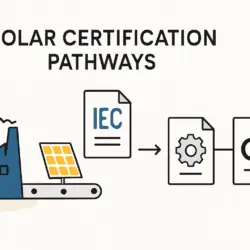Belarus renewable energy policy shift sparks debate over new grid-only sales mandate
New Grid-Only Mandate for Large Producers
New regulations in Belarus now mandate that all renewable energy must be sold to the electricity grid, a departure from previous policies that allowed producers to consume a portion of the power they generated. The Ministry of Energy has stated these restrictions apply to renewable energy facilities with a total capacity of 10 MW or more.
Smaller producers are exempt and can still use some of the energy they generate. However, experts at the Belarusian State Technological University warn that this country policy could significantly impact the country’s renewable energy development, arguing that limiting self-consumption may discourage investment in the sector.
Challenges in Reaching Solar Generation Targets
Belarus has been relying on solar power to meet its renewable energy targets, with a government goal of 1,000 MW of solar capacity by 2025. While the country surpassed this capacity goal—reaching 1,064 MW by the end of 2023, according to the International Renewable Energy Agency (IRENA)—it has faced challenges in electricity generation.
In 2023, Belarus generated only 1,500 GWh of solar electricity, falling well short of its 2,500 GWh target. The Ministry of Energy attributes this shortfall to a lack of investment in solar projects, citing the high cost of panels and limited availability of suitable land. Although the government has offered subsidies and tax breaks to incentivize development, these measures have not been sufficient to attract significant investment. For more insights into the solar manufacturing landscape, refer to the Belarus Solar Panel Manufacturing Report.
How New Sales Restrictions May Impact Investment
The new restrictions on renewable energy sales could further hinder the sector’s growth. By mandating that all generated power be sold to the belarus power grid, the government effectively reduces the profitability of renewable energy projects, which could deter investors and slow the development of new capacity.
Despite these challenges, Belarus has still made some progress, adding 100 MW of new solar capacity in 2023. The government plans to continue investing in renewable energy infrastructure, and the latest developments can be tracked via the Belarus Solar News Archives.
However, the future of the sector remains uncertain. Renewable energy producers are expected to challenge the new regulations, arguing they are unfair and could stifle industry growth. If the restrictions are upheld, they could have a long-term impact on Belarus’s ability to meet its renewable energy targets.
As the country navigates these changes, the success of its renewable energy sector will depend on finding a balance between regulation and investment. The full effect of these new restrictions remains to be seen, but they have already sparked a significant debate about the future of renewable energy in Belarus.



